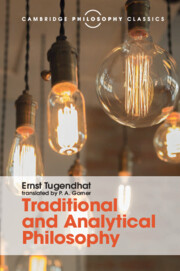Book contents
- Frontmatter
- Dedication
- Contents
- Preface
- Preface
- Translator's preface
- Part I Introduction: confrontation of analytical philosophy with traditional conceptions of philosophy
- Part II A first step: analysis of the predicative sentence
- 8 Preliminary reflections on method and preview of the course of the investigation
- 9 Husserl's theory of meaning
- 10 Collapse of the traditional theory of meaning
- 11 Predicates: the first step in the development of an analytical conception of the meaning of sentences. The dispute between nominalists and conceptualists
- 12 The basic principle of analytical philosophy. The dispute continued. Predicates and quasi-predicates
- 13 The meaning of an expression and the circumstances of its use. Dispute with a behaviouristic conception
- 14 The employment-rule of an assertoric sentence. Argument with Grice and Searle
- 15 Positive account of the employment-rule of assertoric sentences in terms of the truth-relation
- 16 Supplements
- 17 ‘And’ and ‘or’
- 18 General sentences. Resumption of the problem of predicates
- 19 The mode of employment of predicates. Transition to singular terms
- 20 What is it for a sign to stand for an object? The traditional account
- 21 The function of singular terms
- 22 Russell and Strawson
- 23 What is ‘identification’?
- 24 Specification and identification. Specification and truth
- 25 Spatio-temporal identification and the constitution of the object-relation
- 26 Supplements
- 27 Results
- 28 The next steps
- Bibliography
- Index of names
- Index of subjects
27 - Results
from Part II - A first step: analysis of the predicative sentence
Published online by Cambridge University Press: 05 August 2016
- Frontmatter
- Dedication
- Contents
- Preface
- Preface
- Translator's preface
- Part I Introduction: confrontation of analytical philosophy with traditional conceptions of philosophy
- Part II A first step: analysis of the predicative sentence
- 8 Preliminary reflections on method and preview of the course of the investigation
- 9 Husserl's theory of meaning
- 10 Collapse of the traditional theory of meaning
- 11 Predicates: the first step in the development of an analytical conception of the meaning of sentences. The dispute between nominalists and conceptualists
- 12 The basic principle of analytical philosophy. The dispute continued. Predicates and quasi-predicates
- 13 The meaning of an expression and the circumstances of its use. Dispute with a behaviouristic conception
- 14 The employment-rule of an assertoric sentence. Argument with Grice and Searle
- 15 Positive account of the employment-rule of assertoric sentences in terms of the truth-relation
- 16 Supplements
- 17 ‘And’ and ‘or’
- 18 General sentences. Resumption of the problem of predicates
- 19 The mode of employment of predicates. Transition to singular terms
- 20 What is it for a sign to stand for an object? The traditional account
- 21 The function of singular terms
- 22 Russell and Strawson
- 23 What is ‘identification’?
- 24 Specification and identification. Specification and truth
- 25 Spatio-temporal identification and the constitution of the object-relation
- 26 Supplements
- 27 Results
- 28 The next steps
- Bibliography
- Index of names
- Index of subjects
Summary
Despite some obvious gaps and defects in execution I now want to regard the analysis of the mode of employment of elementary singular terms – those with which one can refer to perceptible objects – as concluded. In this lecture I shall merely summarize what follows from this analysis for the understanding of reference to objects, the explanation of the predicative form of sentence, and the elementary use of the word ‘true’. At the outset I predicted that, contrary to the traditional prejudice, the analysis of the mode of employment of expressions which ‘stand for’ objects would be essentially more complicated than the analysis of the mode of employment of predicates. The extent to which this is grounded in the facts of the case has meanwhile become apparent. The analysis of the mode of employment of these expressions is more complicated because the mode of employment is itself more complicated. It is so because the use of individual singular terms, in contrast to the use of elementary perceptual predicates, is not isolable. Therefore the individual expression cannot be explained by itself. Rather the use of any type of singular term refers (verweist) systematically to the use of singular terms of other types; and in part, as we have seen, this reference is even a reciprocal one.
These references (Verweisungen) are expressed in the replaceability of one expression by other expressions in the predicative sentences in which it is used. This replaceability can itself be asserted in an identity-statement. The replaceability of ‘a’ by ‘b’ expressed in the identity-statement ‘a = b’ however, does not fully bring out the phenomenon which I here call ‘reference’, because in an identity-statement neither of the two terms has a priority over the other, whereas in what I call reference it is always the one term that refers to the other; and this is not convertible except where the reference is a reciprocal one. We first encountered this phenomenon in connection with the question: ‘and which object is a?’ (Lecture 23).
- Type
- Chapter
- Information
- Traditional and Analytical PhilosophyLectures on the Philosophy of Language, pp. 386 - 405Publisher: Cambridge University PressPrint publication year: 2016



